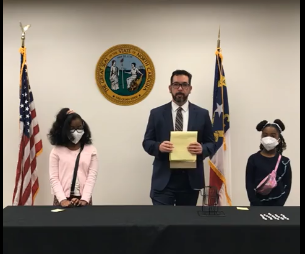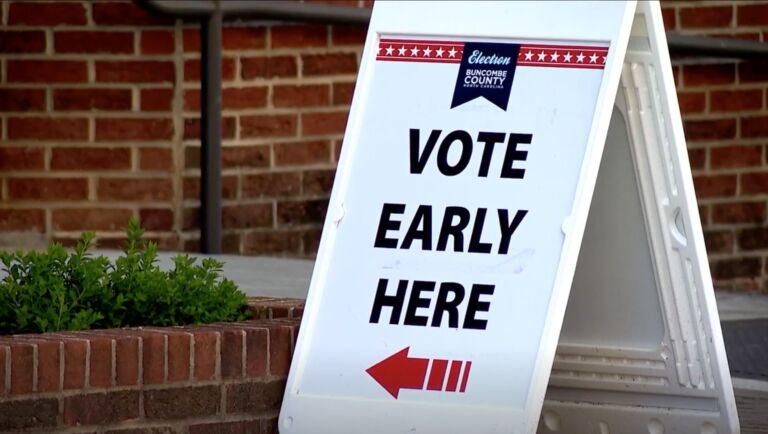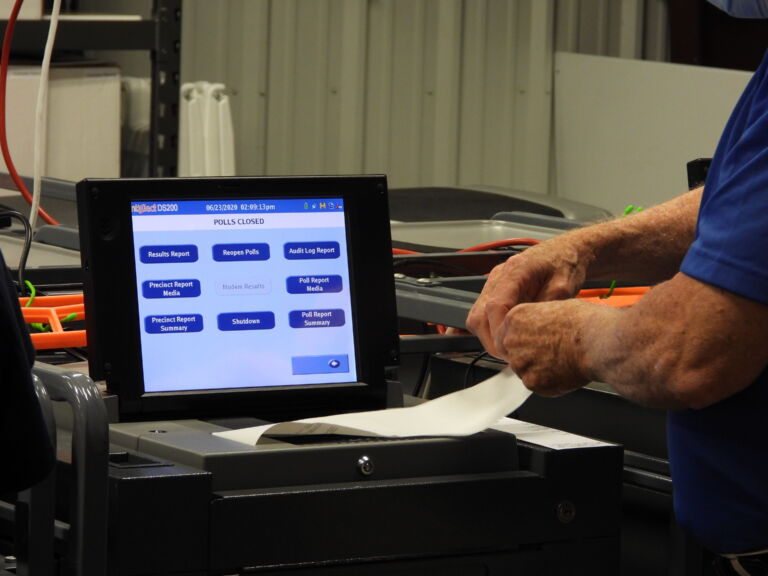The little girls in the video still below may have determined who wins in a couple of close primaries tomorrow. They did that way back on March 4.
Do they have psychic powers?
No, they were the people who randomly selected the ballot order for the May 17 primary. The first girl randomly picked “C” from a set of 26 bingo balls marked with letters of the alphabet. The other girl then got “heads” on a coin flip, meaning that the names on the ballot will go in alphabetical (instead of reverse alphabetical) order.

Video still of the two young ladies who randomly picked the ballot order for the May 17 primary. North Carolina State Board of Elections (SBE) Public Information Director Patrick Gannon is in the middle. Source: video on SBE Facebook page
Why is ballot order important?
Research has found that ballot order can affect the outcome of close elections if the candidates have similar name ID. A 2014 study in Texas found that the effect of ballot order is large, but mitigated by a large difference in the popularity of the candidates and how well-known the candidates are (so a popular, well-known, candidate will not suffer from being lower on the ballot).
So, how big is the advantage of being higher on the ballot order? A 2002 study in New York found that being higher on the ballot is worth about two percentage points for congressional candidates. The advantage for state legislative candidates ranged from a little under two percent to a little over three percent. This is similar to the results of the Texas study, which found that relatively high profile races had a ballot order effect in the low single digits.
Which Races May See Ballot Order Effects?
As noted above, one candidate being much more popular or better-known than the other candidates can mitigate ballot order effects. On the other hand, low information elections can increase those effects.
For that reason, I don’t believe there will be any ballot order effect in either the Republican senate race or the race for Madison Cawthorn’s 11th Congressional District seat.
Below is a list of congressional races that are likely to have a ballot order effect in the primary. To make the list, a race must feature one of the leading candidates in the first or second place in the order. Remember that ballot order proceeds alphabetically from “C.” The candidate most likely to benefit from ballot order is in italics.
1st District Democrats
Don Davis
Erica Smith
Jason Albert Spriggs
Julian Bishop
4th District Democrats
Crystal Cavalier
Valerie Foushee
Matt Grooms
Stephen Valentine
Ashley Ward
Richard Watkins
Clay Aiken
Nida Allam
13th District Republicans
Kelly Daughtry
Renee Ellmers
Bo Hines
Kent Keirsey
Jessica Morel
Chad Slotta
Kevin Alan Wolff
DeVan Barbour
If any of those candidates win the nomination by less than three percent, part of their win will likely be due to being at or near the top of the ballot order.


